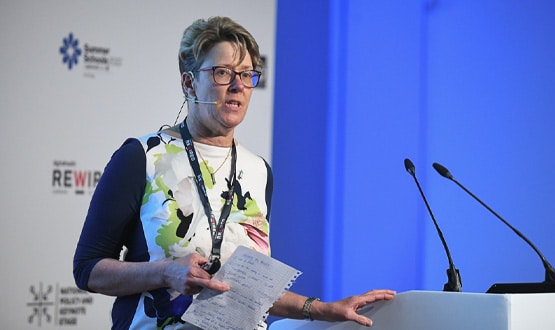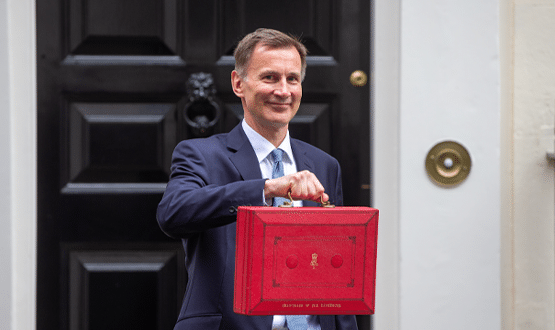Live from Birmingham
- 11 November 2013

Health secretary Jeremy Hunt announced in January that he wanted to see a ‘paperless’ NHS by 2018.
The government has backed this aim with two technology funds, which, with matching funding, will deliver £1 billion to NHS IT over the next three years.
NHS England’s national director of patients and information Tim Kelsey said this is the largest pot of money for health IT – essentially without strings attached – that has ever been available.
There was certainly a feeling at EHI Live 2013 in Birmingham this month that the market is more vibrant and lively than it has been for years, but is the paperless state achievable? And if it is, what will it deliver?
An industry perspective
The chair of technology industry body Intellect, Andrew Hartshorn, told the first session of the conference that the organisation is delighted by the challenge.
"From a supplier perspective, we’ve always said it’s a great ambition; an important challenge to deliver. We’re not going to say it can’t be done, but we would like a debate about how it can be done," he said.
He added that industry wants a roadmap, as the biggest challenge is delivery is the very tight timetable. In order to achieve the level of digitisation necessary, organisations will need to sweat the assets they already have and bring in new products and services at the same time, he pointed out.
Other speakers identified many obstacles to the NHS taking up technology and then making effective use of it, ranging from ongoing problems around procurement rules, to financial constraints, and a persistent belief that technology is “the answer” that results in projects being IT-led rather than clinically-led.
Cerner analyst Kate Wensley argued that paperless should be "a coincidence of doing things differently", rather than "paperless for the sake of becoming paperless.”
"We need to fundamentally transform the way health care is delivered to address the challenges facing the NHS," she said. Intellect vice chair Mark Treleavan echoed her thoughts and the call from many others for clinicians to lead the way in transforming their organisations.
"We have been running IT projects rather than clinical transformation projects, we need them to be clinically led and benefits driven. It has to be up to clinicians to change what they do and technology is there to support that," he said.
Looking out from the centre
It’s not just industry that is pushing this message. Director of strategic systems and technology at NHS England Beverley Bryant warmed to the same theme.
She told the conference that the commissioning board is taking the lead on a national technology strategy, due in March, to make sure that "technology does not become a means in itself" and to pull together interests from across health and social care.
"It’s really important to stress that we as the NHS and care system need to join ourselves up digitally and move to a digital environment," Bryant told the NEC. "The only way to deliver this revolution is through collaboration with the market and IT professionals.”
She revealed that NHS England is starting to broker introductions between industry and NHS trusts that need help to get safe digital record keeping in place and is holding its "first big match-making event on 3 December."
In an earlier session on open source, she also said that NHS England is keen to make suppliers understand that open source can provide them with opportunities.
“There’s been talk that it’s a detriment to suppliers, but we believe it’s a way to improve technology and stimulate growth,” she said.
“The point is that what I want to do is attract proprietary software suppliers to open source. If we’re going to achieve the digital revolution, everyone needs to pull together.”
Back to the real world
Set against the aspirations of the centre and desires of suppliers, were two fascinating stories from the ‘coal face’ of health IT.
King’s College Hospital NHS Foundation Trust chief clinical information officer Dr Jack Barker and eHospital programme manager at Cambridge University Hospitals NHS Foundation Trust Carrie Armitage gave hugely engaging and honest presentations about what implementing technology is like on the front line.
Dr Barker described how his trust tried to launch e-clerking four times before getting it right, the first three times having to withdraw because the software was not usable.
"Clinicians have to want to use this more than grabbing a piece of paper and that’s a challenge," he said. "We bend over backwards to try to get user acceptance."
While King’s has been building its electronic patient record for 15 years in a best of breed approach, Cambridge is going from a “homegrown, haphazard, unstructured” IT base to a full EPR in just 18 months, since it is aiming for a "big bang" implementation of its Epic EPR on 25 October next year.
And onto the Epic way
Cambridge is spending £200m on the eHospital programme over ten years, of which the vast majority (70%) is going towards improving its infrastructure as part of deal with HP. Another £40m is for the implementation and licenses for Epic and £20m in trust costs for implementation.
Even so, Armitage also stressed that the project is not about trying to implement technology. “The most challenging thing we have to do is embed technology into the health care process; that means people – patients, clinicians – that’s the hard bit,” she said.
The trust’s business case is “wholly dependent on the technology being at the heart of that care process.”
As part of “the Epic way” of doing things, Cambridge has had to commit 100 staff to work full-time on the project for 18-months to become accredited Epic analysts, of whom 22 are consultants.
During three weeks in July and August, the trust arranged 260 sessions lasting one to two hours for staff to feedback on whether Epic’s workflows could be used at Cambridge and they had a 90% acceptance rate.
Over two months, the trust built more than half of the workflows needed for go-live; and it is now thinking about getting 500 super-users identified before Christmas.
The intensity of Cambridge’s experience is unique in the NHS, but the level of commitment and resource required is not news to those with implementation experience.
There is hope
Hartshorn argued that, despite the many obstacles identified to getting IT in place and well-used within the NHS, there is at least space for this kind of innovation these days.
While the centre is offering incentives and setting the long-term goals, he said, it is no longer being prescriptive about how organisations achieve them. At the same time, he said NHS England is much more willing than some of its predecessors to work with industry.
Hartshorn said Intellect had been "consistently involved” with NHS England and its predecessor body, the NHS Commissioning Board, about “creating innovations in the market place” and making sure that it was not “writing policy in a vacuum.”
"Policy makers are recognising that there’s no point asking people to fly to the moon if they are only willing to buy paper aeroplanes," he said.
He also told the event he was hopeful that the Safer Hospitals, Safer Wards: Technology Fund is aiming for "burning ambitions rather than burning platforms.”
"If all they are doing is replacing what they have got now that would be very underwhelming. We need something that demonstrable shows the NHS is in control of the spend and is spending transformationally," he said.



